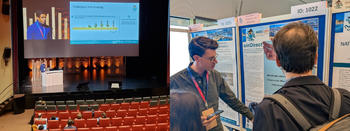Paper & Poster Publications at IEEE VR 2025
The UMTL has published a new full-paper and a new poster at the international IEEE VR 2025 conference in Saint-Malo, France!


Left: Moiz Sakha presenting their new paper in the conference's grand auditorium. Right: André Zenner explaining the poster to conference attendees.
Enhancing Plant Variety Discovery Process with Visual Trait Assessment in VR
Muhammad Moiz Sakha, Florian Daiber, Matthias Enders, Christoph Tieben, Benjamin Kisliuk, Antonio Krüger
Muhammad Moiz Sakha presented a paper that addressed limitations in traditional plant breeding. The paper introduces an innovative approach integrating data acquisition via an autonomous field robot and an immersive VR interface for remote visual trait assessment in breeding field trials. The robot captures images, spectral data, and 3D scans of canola field trials, and the VR application provides realistic 3D visualizations of breeding candidates. This enables breeders to compare candidates across locations and growth stages—capabilities not possible in traditional field trials. The research was supported by the BMEL-funded PORTAL project.
Abstract:
Plant breeders use field trials across locations and years to identify superior plant varieties with traits such as disease resistance and higher yield. However, comparing breeding candidates across locations and years is challenging and resource demanding. To address this, we developed an integrated system that combines data acquisition through a field robot with an immersive virtual reality (VR) interface for remote assessments. The robot autonomously collects images, spectral data and 3D scans of canola breeding trials. Our VR application, developed through a user-centered approach, offers photo-realistic 3D visualizations, enabling breeders to compare candidates across locations and growth stages—capabilities unavailable in field assessments. In a user study, five breeders conducted visual trait scoring in VR to evaluate how well the system supported typical field trial tasks. The results demonstrated consistent scoring patterns among raters. Feedback from breeders indicated that the ability to compare candidates across locations and growth stages enhanced their decision making in trait assessment. This work highlights the potential of combining robotics and VR to transform data-intensive processes in agriculture.
winDirect: Studying the Effect of a Wind-Based Haptic Bracelet on Presence and the Detectability of Hand Redirection
Ulrike Kulzer, André Zenner, Donald Degraen (University of Canterbury, New Zealand)
André Zenner presented the poster introducing a novel haptic bracelet that simulates wind in virtual environments. In a psychophysical user experiment, the effect of the haptic device on the detectability of hand redirection was investigated. The device and experiment was developed in the context of Ulrike Kulzer's Master's thesis at the UMTL.
Abstract:
We developed a wind-based wearable haptic feedback device called winDirect to investigate if multimodal stimuli can be used to disguise hand redirection (HR) by increasing corresponding perceptual detection thresholds (DTs) in users. Our investigation was motivated by the findings of two previous works, which showed multimodal stimuli to increase presence, and indicated an increased feeling of embodiment to increase the DTs of HR. In contrast to our expectations, we found that the integration of multimodal stimuli did not guarantee increased HR DTs, even when increasing presence - highlighting the need to study correlations between presence and HR more deeply.
